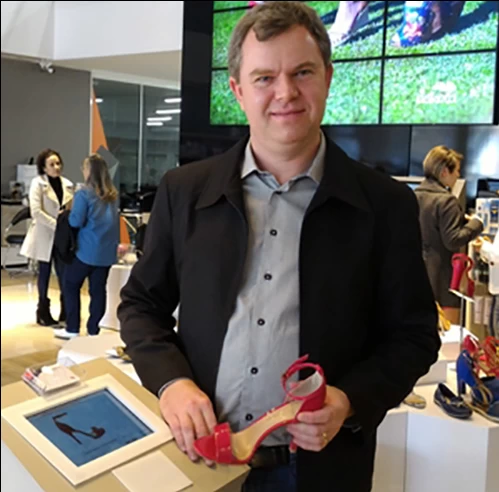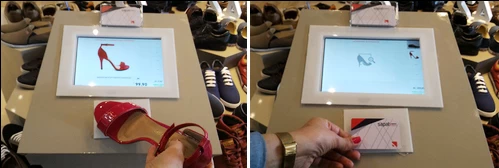Brazilian shoe store Sapati is using an RFID platform to enhance the consumer experience. At present, the system has completed its first year of operation, and store sales have increased by 100%. The platform was developed by Vanderlei Kichel, CEO of footwear ERP company SetaDigital.
According to Kichel, consumers are enjoying the RFID experience, which can streamline sales and make purchases in less than a minute.

Vanderlei Kichel, CEO of SetaDigital and founder of Sapati, stands next to a system for identifying footwear and records information on RFID cards to add orders to a virtual shopping cart.
Kichel said that marking shoes is the biggest challenge facing Sapati. He explained: "Shoe factories need to label shoes to shorten the work that needs to be done during sales.
He explained: "Shoe factories need to label shoes to shorten the work that needs to be done during sales. In addition, if a tag is attached to the shoe during manufacture, the RFID system can also track the production process or be used to prevent theft."
The entrepreneur said he is negotiating with companies in the footwear industry to deploy RFID inside the factory, which will help control factory inventory.
Kichel said that several Digital Arrow customers who visited Sapati became interested in some solutions, such as inventory control, and eventually acquired Sapati technology. "Other technologies in the solution, such as augmented reality, are also attracting customer interest when used with RFID," he noted.
Omni-channel retailing is another hot trend. "We have 40 customers using an omnichannel sales model, and some of them are planning to use RFID to control inventory," Kichel said.
Sapati is a laboratory for testing SetaDigital's new technology, and all sales profits are reinvested into project development. Kichel said Sapati solves the problem that customers don't know what to buy.

The customer first contacts the shoe to an RFID reader, and then writes the product to a card that acts as a virtual shopping cart.
Kichel explained, "With this store, we can assess the pain points in the industry, develop tools for testing, and continue to improve." The company invests $ 1 million annually in innovation.
SetaDigital plans to invest $ 462,000 to expand its services to other Latin American countries. SetaDigital has been developing and providing software and services for shoe retailers for 10 years. The company already serves 1,000 stores in Brazil.




